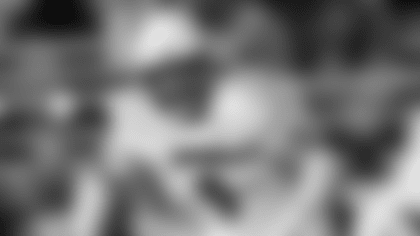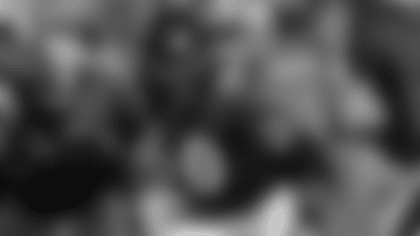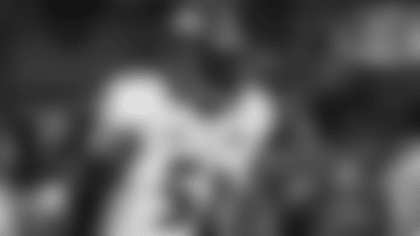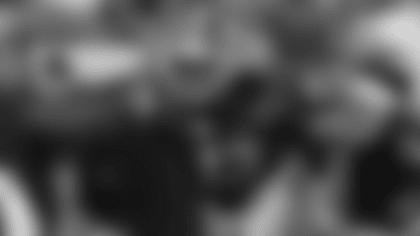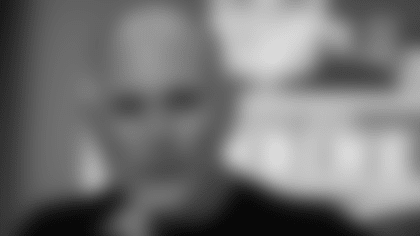JAMAL LEWIS RING OF HONOR PRESS CONFERENCE
General Manager/Executive Vice President Ozzie Newsome:
"Thanks for coming. As we've done in past years, each year we select someone to go into the Ring of Honor, and this year Jamal Lewis is the player that will be receiving that honor. I'd like to begin with how I first came to know about Jamal: [Former Ravens personnel staffer] Phil Savage was on a recruiting trip to the University of Tennessee, and he came back, and he was talking about this player who was rehabbing an ACL injury and who was working out in a sand pit, and he marveled at how this player was working. [Phil] came back and said, 'They have a player down at the University of Tennessee by the name of Jamal Lewis.' Well, the following year, it was during the bye week, Alabama played Tennessee the first Saturday in October. Jamal and I know that date quite well. I had the opportunity to go to the game; it was during the bye week. There were probably, maybe, a dozen first-round picks in the game; Jamal was in the game and so was Shaun Alexander. As the game went on, it was a very close game, but when a play needed to be made, Jamal stepped up and he had, I think, a 50- or 60-yard run to seal the game for the University of Tennessee. When it came to us deciding who to pick with that fifth pick, Brian [Billick, former Ravens head coach] and I had discussed that we needed a way to get explosive plays. Everybody in our division – Pittsburgh, Tennessee, Jacksonville – they all had very good defenses, and we needed someone that was going to be able to break some tackles. Priest [Holmes] was our running back at that time, and we felt in order for us to grow as an offense, if we could get someone who could be a tackle-breaker, that would be very beneficial for us. But, what we got was not only a tackle-breaker in Jamal, we got a guy that could finish the run. With the speed that he had, and once he got into the secondary, people did not want to tackle Jamal. So, as you look at his first year, and I never will forget [it] … I am at the Hall of Fame the year after I was inducted, and I got a call from Phil, and Jamal had hurt his elbow in a game against the Redskins, a scrimmage or a preseason game, one or the other. And [I remember] how disappointed everybody was. But what that did was allow Jamal to be fresh at the end of the season when we really needed him, by him not being able to play in those first five weeks. So, he came in – the records are what they are, you have all the stats – and the thing that I admired most about Jamal [was] he, in my mind, was probably one of the most mature rookies that we had come through our organization. In his rookie year, you very seldom see this: Jamal could hang with Ray [Lewis], Shannon [Sharpe] and Rod Woodson. He was part of their group; he was one of them. And the way he could handle himself in that mix, you're talking about two who are in the Hall of Fame and one that's going, Jamal was one of those guys. That showed the maturity that he had once he got here. And, I can sum this up by saying that the reason why we were able to win the Super Bowl in 2000 was because of Jamal Lewis. But, I think the reason we didn't win in 2001 was that Jamal got hurt and we weren't able to replace him. Jamal, thanks."
Ring of Honor Inductee RB Jamal Lewis
"Thanks a lot. Thanks, Ozzie. Never did I think, 12 years later, that I would be standing here accepting this great honor. This is where it all started for me. Thanks to Ozzie Newsome and Phil Savage and the organization at the time, for even taking a chance on me when a lot of guys really wouldn't at the time. But, coming into this organization, it was a first-class organization under Art Modell, Steve Bisciotti and just a great group of people. For a 20-year-old coming out of Atlanta, Georgia, to a city that I'd never been to, better yet a part of the country I'd never been to, it was just a great honor to play here for the years that I was here. I learned a lot, was around a lot of great players. This is just a great honor, and I'm glad to be back accepting this honor. It's just a good feeling and it was great playing in the AFC north. It's a great conference; it fit my style of running. I loved it even more than you would think. That's pretty much it for now. I will open it for questions."
Ozzie talked about your maturity at a very young age. The next year as a rookie when you went to a Super Bowl, did that big stage faze you at all? (Joe Platania)"No, it really didn't. Early on in the season, one of the players that is still here basically [said] in the locker room, which was Ray Lewis, he called me over … We really didn't talk that much early [in the year], but then he kind of felt me out a little bit and he said, 'Hey man, let's get together and hang out.' That's kind of where it all kicked off. Being around him and Shannon and Ron Woodson, just all those older guys, it was like a grooming process. Going through that season, think about it, we were gutted every single week. So, every single week I am sitting back with Ray Lewis and Shannon Sharpe, and they are talking about the things that we needed to do in order to get to the Super Bowl, just to win the next game. And I think that's what made me more comfortable on that stage when we were going through the playoffs and leading up to the Super Bowl. That's really why I really wasn't that affected. Plus, I didn't play a national championship game in college, so I was hoping that I could get a championship that I could play in, and I ended up coming up with the Super Bowl. So, it was a great feeling, it was a great time, and I will never forget it."
What special memories do you have of that 2003 season when you ran for 2,000 yards? (Ryan Mink)"That was a great year. I remember the first game, starting out against Pittsburgh, I think I had 15 carries, probably 56 yards or something crazy. And that next week, I remember Brian saying, 'If we don't give it to him 30 times, it's a problem.' And, I just answered the bill. That next game against Cleveland, that's where it all opened up, and we were able to really put in some work. Unfortunately, Kyle Boller got hurt that first game, so we just had to depend on the running game. And that's what we did. I think from that game on it was just like we were out there having a good time. The offensive line, especially after the game where we broke that record having 295, then it kind of set the tone for that whole season – at least for running the football."
How much do you miss the camaraderie of your teammates and playing in the NFL? (Jeff Zrebiec)"I get asked all the time, 'Do you miss it? Do you miss it when you are watching the football games?' No, I do not miss the hitting, I do not miss the cold tubs after or any of that. But at the same time, I miss, as you said, the camaraderie, the locker room, just all the different personalities, meeting other guys after the games, or just going through the wins and losses. Rarely [does] a person get a sense of that kind of team just on a day-to-day basis out in the real world. But, that's pretty much what I miss about the game. And seeing Ray still out there doing the same things that he was doing when I first came in is very impressive. He's a great leader and he's pretty much instilling the same leadership and the same focus and the same passion in a lot of these young guys the same way he did me."
How is your health these days? (Aaron Wilson)"Health-wise, doing pretty good. I try to work out a little bit here and there. But, I still feel a few old pains. At the same time, you just push through it and keep going. I feel pretty good."
Do you have any problems related to concussions, which is a hot topic in the NFL these days? (Aaron Wilson)"Well, there are a lot of things that guys are dealing with, but due to the whole lawsuit issue, I really can't go too much into that. Those things are being worked out. I'm not getting up falling out of bed every morning, I can tell you that."
Jamal, being able to come back into M&T Bank Stadium, being a fan favorite, how is that going to feel to you to walk back into that stadium and remember how loud it used to be? (Bill West)"It will be a great feeling, probably a very emotional one at the same time. Just the fans in the stands and just remembering that first day running through the tunnel like, 'This is really it.' I guess it will be the same thing this time. This is it. Like I said, I am very honored for this. It's just a great deal, and it's a good way to go out. Like I said, I never thought 12 years ago that we would be doing this. But here it is, and I take it all in deeply."
Jamal, that physical style that you use of running at and over people, is that something that came naturally to you? Did you do it in high school and college? And were you surprised that you were able to keep doing it in the NFL? *(John Eisenberg) *"As a running back, I think a lot of running backs, the way you end up playing the position is you don't want to get hit, so you want to run away from people all the time. I think that's pretty much how I got into this position. My dad always told me: 'Be the hitter.' That's kind of what was always instilled in my work ethic and how I really ran the ball. It's more of an intimidation factor also. I am not a big talker, you guys probably know that. I am not a big talker, so I kind of like to lead by example and gain my respect by how I played the game on the field. I think I did that. I think I did that over the years, and it feels good to hear a guy say that you were tough to play against and being to get those tough yards and being able to go through a four-minute offense at the end of the game and grind it out and just not be stopped; it's a great feeling. Ever since high school, middle school, even before that, that was pretty much my style, [which] is to run you over rather than run around you."
Other than the Super Bowl and the 295-yard performance against Cleveland in 2003, what are some of the other games that stand out in your mind as some of your favorite performances over your career? (Matt Vensel)"There were a lot of them. But, that year [2003] was a very, very special year, but I think the first season [2000], going through the playoff games and just knowing how our backs were against the wall and just how everybody pulled together, I think that was probably my most memorable season and just how we played as a team, and that's what you do it for. That's how Super Bowls are won. I think that was probably my most memorable season, and just grinding it out that whole year and just winning a Super Bowl. I thought it would be like that every year, but I found out that it's a pretty hard task."
Jamal, you played 10 years in the league, three of them in Cleveland, 30 percent of your career. But, how much of your memory is attributed to Baltimore compared to Cleveland? I am assuming more than 70 percent. (Dave Ginsburg)"Oh yeah. A lot of my memories are pretty much here, because this is kind of where I grew up. Like I said, I was 20 years old coming out of college. Coming up to Baltimore, it was like home for me. I had some good times in Cleveland, I must say, but at the same time, this is where it all started. Here, it was like I was more the young guy that was raised and groomed into this organization. There, I was kind of like the old guy, being the Ray Lewis and trying to lead these guys in the right direction. A lot of my memories pretty much come from here. Just like I said, week-in and week-out, just putting things together … [Former Raven] Jonathan Ogden, the [Tony] Siragusas, Rob Burnett, [Michael] McCrary, like a lot of these guys that I was locker mates with, the Chris McAlisters – we just had a great time here, whether it was on the field, off the field or whatever it may have been. There were a lot of memories made here."
Jamal, given the fact that you played with such a physical defense, do you think Baltimore was the perfect fit for you as opposed to if you wound up in a city with more of finesse style? (Luke Jones)"Oh yeah, most definitely. My game pretty much fit the mold just right for this team. Coming into this team not knowing who Ray Lewis was, not knowing who a lot of these guys were, practicing against them, doing training camp or in certain practices … It was a very physical defense, and a very intimidating defense at that. I like to bring the same kind of passion and the same kind of physicality to the field when we are on offense, just to gain that respect. I always felt that I was a defensive player playing on offense. So, I think that's why I always ended up hanging around linebackers or the defensive side of the ball, because I wasn't the finesse type of guy. That was more of what I brought to the game, a more type of defensive style of running."
**Jamal, how do you feel about the way the game has evolved now with teams passing 60-65 percent of the time and not as many Sam Gash-, Chuck Evans- or Lorenzo Neal-type fullbacks out there lead-blocking? *(Joe Platania) *"It's just one of those things. That's how football is. It evolves over time, and right now, it's about putting up a lot of points on the board. You usually don't get that out of the running game; you get that more out of the passing game. So, I think that you owe that to the Tom Bradys of the world and the Peyton Mannings, those guys throwing the ball around the way they do. But now, as far as the running back, I don't know if I would make it right now. I don't think there are enough carries being given to one running back. You don't find too many featured running backs in the league like you did in the past. Now, it's more of a by-committee type of thing. Mainly, I think, that's to keep guys fresh and to keep guys from getting injured and things of that nature. But, it has evolved, and you see a lot of passing, you see a lot of points going up on the board nowadays as well. It's pretty exciting."
**Jamal, what do you think of one of your predecessors, a guy that is playing now, Ray Rice? *(Aaron Wilson) *"He is a great running back, very explosive, adds a lot to the game as far as being able to catch the ball out in the open and being able to run the ball as well. He is a double-hitter. He is a great, explosive player, and I like to watch him play. [He is] a good blocker as well. If he keeps going, those numbers are going to keep on climbing."
When you look back, what was it like for you at just 21 years old to have such a big part of the Super Bowl? And what was it like for you at a young age leading up to the game that week? (Jason Butt)"It was great. I think that week, for me, was more of, 'Do not go in here and lose this game after all that you guys have been through.' That was just my focus. I think we kind of knew that we were going to win that game, just on the season and how it was going and just how motivated we were. But, one of the biggest things going into that week, it was just hands down how the organization treated us. Every time we went to the room, you had a gift on your bed or something. That was just a good moment of appreciation that came from up top and where we were and what we had been through. I think that's what kind of stuck out the most during that whole week, other than going to the game and [Brandon] Stokley catching that big pass down the middle. It was just a great feeling."
You obviously hit a lot of players with your running style, but can you think of one opponent that hit you harder than anybody else? (Bruce Raffel)"I would have to say, at a young age, rest in peace [former Redskins safety] Sean Taylor. He was a great safety, and I never saw a safety fill the hole the way he did. I don't know if it was just unexpected or if he gave me a good pop. Other than that, there were a lot of hits – [former Broncos LB] Al Wilson and [current Chargers LB] Takeo Spikes. Those guys pretty much brought it every week, week-in and week-out. [There were] a lot of hits, but those were ones that come to mind."


